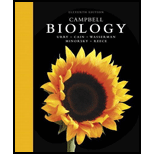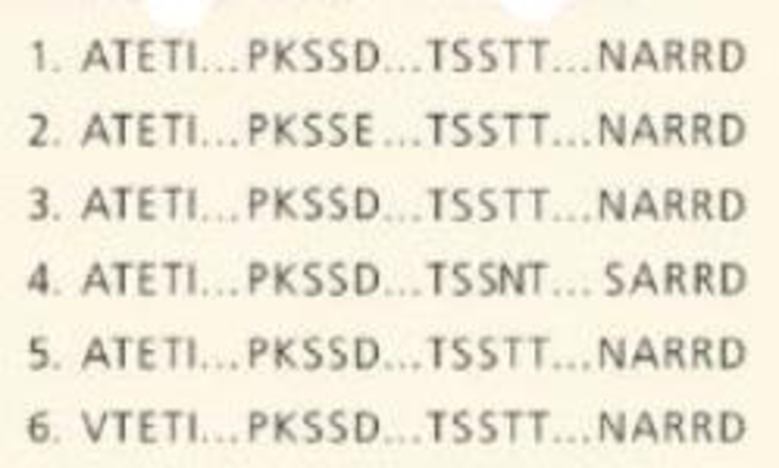
Campbell Biology (11th Edition)
11th Edition
ISBN: 9780134093413
Author: Lisa A. Urry, Michael L. Cain, Steven A. Wasserman, Peter V. Minorsky, Jane B. Reece
Publisher: PEARSON
expand_more
expand_more
format_list_bulleted
Textbook Question
Chapter 21, Problem 4TYU
DRAW IT Below are the amino acid sequences(using the single-letter code; see Figure 5.14) of four short segments of the FOXP2 protein from six Speeles: chimpanzce (Q, orangutan (()), gorllla (G), rhesus macaque (R), mouse (M), and human (H). These segments contain all of the amino acid differences helween the FOXP2 proteinsof these species.

Use a highlighter to color anv amino acid that varies among the species. (Color that amino acid in all sequences.
- (a) The C, G, R sequences are identical. Identily which lines correspond to those sequences.
- (b) The O sequence differs from the C, G, R speieces at two amino acids. Underilnethetwodlffcrences inthe H sequence.
- (c) The O sequence diffen from the C, G, R sequences at one amino acid (having V instead of A) and from the H sequence at three amino acids. Identify tho O sequence.
- (d) In the M sequence,circle the amino acid(s) that differ from the C, G, R sequence, and draw a square around those that differ from the H sequence.
- (e) Primates and rodents diverged between 60 and IO0 million years ago. and chimpanzees and humans about 6 million years ago. Compare the amino acid differences between the mouse and the C, G, R species with those between the human and the C, G, R species. What can you conclude?
Expert Solution & Answer
Learn your wayIncludes step-by-step video

schedule09:19
Students have asked these similar questions
Stage
Percent
Time in Hours
Interphase
.60
14.4
Prophase
.20
4.8
Metaphase
.10
2.4
Anaphase
.06
1.44
Telophase
.03
.72
Cytukinesis
.01
.24
Can you summarize the results in the chart and explain which phases are faster and why the slower ones are slow?
Can you circle a cell in the different stages of mitosis?
1.prophase
2.metaphase
3.anaphase
4.telophase
5.cytokinesis
Which microbe does not live part of its lifecycle outside humans?
A. Toxoplasma gondii
B. Cytomegalovirus
C. Francisella tularensis
D. Plasmodium falciparum
explain your answer thoroughly.
Chapter 21 Solutions
Campbell Biology (11th Edition)
Ch. 21.1 - Describe the whole-genome shotgun approach.Ch. 21.2 - Prob. 1CCCh. 21.2 - Explain the advantage of the systems biology...Ch. 21.2 - MAKE CONNECTIONS The ENCODE pilot project found...Ch. 21.2 - MAKE CONNECTIONS In Concept 20.2, you learned...Ch. 21.3 - The best estimate is that the human genome...Ch. 21.3 - The Genomes Online Database (GOLD) Website of the...Ch. 21.3 - WHAT IF? What evolutionary processes might...Ch. 21.4 - Discuss the characteristics of mammalian genomes...Ch. 21.4 - VISUAL SKILLS Which of the three mechanisms...
Ch. 21.4 - Contrast the organizations of the rRNA gene family...Ch. 21.4 - MAKE CONNECTIONS Assign each DNA segment at the...Ch. 21.5 - Describe three examples of errors in cellular...Ch. 21.5 - Explain how multiple exons might have arisen in...Ch. 21.5 - What are three ways that transposable elements are...Ch. 21.5 - WHAT IF? In 2005, Icelandic scientists reported...Ch. 21 - How did the Human Genome Project result in more...Ch. 21 - What has been the most significant finding of the...Ch. 21 - Compare genome size, gene number, and gene density...Ch. 21 - Explain how the function of transposable elements...Ch. 21 - How could chromosomal rearrangements lead to the...Ch. 21 - What type of Information can be obtained by...Ch. 21 - Bioinformatics intludes all of the following...Ch. 21 - Homeotic genes (A) encode transcription factors...Ch. 21 - Prob. 3TYUCh. 21 - DRAW IT Below are the amino acid sequences(using...Ch. 21 - EVOLUTION CONNECTION Genes important in the...Ch. 21 - scientific inquiry The scientists mapping the SNPs...Ch. 21 - Prob. 7TYUCh. 21 - SYNTHESIZE YOUR KNOWLEDGE Insects have three...
Additional Science Textbook Solutions
Find more solutions based on key concepts
Explain all answers clearly, with complete sentences and proper essay structure if needed. An asterisk (*) desi...
Cosmic Perspective Fundamentals
27. Consider the reaction.
Express the rate of the reaction in terms of the change in concentration of each of...
Chemistry: Structure and Properties (2nd Edition)
Two culture media were inoculated with four different bacteria. After incubation, the following results were ob...
Microbiology: An Introduction
Which one of the following is not a fuel produced by microorganisms? a. algal oil b. ethanol c. hydrogen d. met...
Microbiology: An Introduction
95. What is the minimum amount of necessary to produce 15.0 g of according to the reaction:
...
Introductory Chemistry (6th Edition)
Johnny was vigorously exercising the only joints in the skull that are freely movable. What would you guess he ...
Anatomy & Physiology (6th Edition)
Knowledge Booster
Similar questions
- Select all of the following that the ablation (knockout) or ectopoic expression (gain of function) of Hox can contribute to. Another set of wings in the fruit fly, duplication of fingernails, ectopic ears in mice, excess feathers in duck/quail chimeras, and homeosis of segment 2 to jaw in Hox2a mutantsarrow_forwardSelect all of the following that changes in the MC1R gene can lead to: Changes in spots/stripes in lizards, changes in coat coloration in mice, ectopic ear formation in Siberian hamsters, and red hair in humansarrow_forwardPleiotropic genes are genes that (blank) Cause a swapping of organs/structures, are the result of duplicated sets of chromosomes, never produce protein products, and have more than one purpose/functionarrow_forward
- A loss of function mutation in Pitx1 enhancers can cause (blank) Removal of Pitx1 exons and growth of ectopic hindlimbs, growth of extra ectopic forelimbs, loss of forelimb specification and development, and loss of hindlimb specification and developmentarrow_forwardHox1a most likely contributes to (blank) patterning in the developing embryo? Ventral, posterior, limb or anteriorarrow_forwardSelect all of the following that can help establish Hox gene expression boundaries (things that affect Hox and not things that Hox affects). Retinoic acid, anterior/posterior axis, fibroblast growth factors, vagal neural crest, and enhancersarrow_forward
- Ectopic expression of Hox often results in (blank) phenotypes. (Blank) transformations are characterized by the replacement of one body part/structure with another. Hoxeotic, homealoneotic, joexotic, or homeoticarrow_forwardWhat's the difference when drawing omega-6 and omega-3?arrow_forward. Consider a base substitution mutation that occurred in a DNA sequence that resulted in a change in the encoded protein from the amino acid glutamic acid to aspartic acid. Normally the glutamic acid amino acid is located on the outside of the soluble protein but not near an active site. O-H¨ A. What type of mutation occurred? O-H B. What 2 types of chemical bonds are found in the R-groups of each amino acid? The R groups are shaded. CH2 CH2 CH2 H2N-C-COOH H2N-C-COOH 1 H Glutamic acid H Aspartic acid C. What 2 types of bonds could each R-group of each of these amino acids form with other molecules? D. Consider the chemical properties of the two amino acids and the location of the amino acid in the protein. Explain what effect this mutation will have on this protein's function and why.arrow_forward
- engineered constructs that consist of hollow fibers are acting as synthetic capillaries, around which cells have been loaded. The cellular space around a single fiber can be modeled as if it were a Krogh tissue cylinder. Each fiber has an outside “capillary” radius of 100 µm and the “tissue” radius can be taken as 200 µm. The following values apply to the device:R0 = 20 µM/secaO2 = 1.35 µM/mmHgDO2,T = 1.67 x 10-5 cm2/secPO2,m = 4 x 10-3 cm/secInstead of blood inside the fibers, the oxygen transport and tissue consumption are being investigated by usingan aqueous solution saturated with pure oxygen. As a result, there is no mass transfer resistance in the synthetic“capillary”, only that due to the membrane itself. Rather than accounting for pO2 variations along the length ofthe fiber, use an average value in the “capillary” of 130 mmHg.Is the tissue fully oxygenated?arrow_forwardMolecular Biology Please help with question. thank you You are studying the expression of the lac operon. You have isolated mutants as described below. In the presence of glucose, explain/describe what would happen, for each mutant, to the expression of the lac operon when you add lactose AND what would happen when the bacteria has used up all of the lactose (if the mutant is able to use lactose).5. Mutations in the lac operator that strengthen the binding of the lac repressor 200 fold 6. Mutations in the promoter that prevent binding of RNA polymerase 7. Mutations in CRP/CAP protein that prevent binding of cAMP8. Mutations in sigma factor that prevent binding of sigma to core RNA polymerasearrow_forwardMolecular Biology Please help and there is an attached image. Thank you. A bacteria has a gene whose protein/enzyme product is involved with the synthesis of a lipid necessary for the synthesis of the cell membrane. Expression of this gene requires the binding of a protein (called ACT) to a control sequence (called INC) next to the promoter. A. Is the expression/regulation of this gene an example of induction or repression?Please explain:B. Is this expression/regulation an example of positive or negative control?C. When the lipid is supplied in the media, the expression of the enzyme is turned off.Describe one likely mechanism for how this “turn off” is accomplished.arrow_forward
arrow_back_ios
SEE MORE QUESTIONS
arrow_forward_ios
Recommended textbooks for you
 Biology: The Dynamic Science (MindTap Course List)BiologyISBN:9781305389892Author:Peter J. Russell, Paul E. Hertz, Beverly McMillanPublisher:Cengage Learning
Biology: The Dynamic Science (MindTap Course List)BiologyISBN:9781305389892Author:Peter J. Russell, Paul E. Hertz, Beverly McMillanPublisher:Cengage Learning Biology Today and Tomorrow without Physiology (Mi...BiologyISBN:9781305117396Author:Cecie Starr, Christine Evers, Lisa StarrPublisher:Cengage Learning
Biology Today and Tomorrow without Physiology (Mi...BiologyISBN:9781305117396Author:Cecie Starr, Christine Evers, Lisa StarrPublisher:Cengage Learning Human Heredity: Principles and Issues (MindTap Co...BiologyISBN:9781305251052Author:Michael CummingsPublisher:Cengage Learning
Human Heredity: Principles and Issues (MindTap Co...BiologyISBN:9781305251052Author:Michael CummingsPublisher:Cengage Learning BiochemistryBiochemistryISBN:9781305577206Author:Reginald H. Garrett, Charles M. GrishamPublisher:Cengage Learning
BiochemistryBiochemistryISBN:9781305577206Author:Reginald H. Garrett, Charles M. GrishamPublisher:Cengage Learning Concepts of BiologyBiologyISBN:9781938168116Author:Samantha Fowler, Rebecca Roush, James WisePublisher:OpenStax College
Concepts of BiologyBiologyISBN:9781938168116Author:Samantha Fowler, Rebecca Roush, James WisePublisher:OpenStax College

Biology: The Dynamic Science (MindTap Course List)
Biology
ISBN:9781305389892
Author:Peter J. Russell, Paul E. Hertz, Beverly McMillan
Publisher:Cengage Learning

Biology Today and Tomorrow without Physiology (Mi...
Biology
ISBN:9781305117396
Author:Cecie Starr, Christine Evers, Lisa Starr
Publisher:Cengage Learning

Human Heredity: Principles and Issues (MindTap Co...
Biology
ISBN:9781305251052
Author:Michael Cummings
Publisher:Cengage Learning

Biochemistry
Biochemistry
ISBN:9781305577206
Author:Reginald H. Garrett, Charles M. Grisham
Publisher:Cengage Learning

Concepts of Biology
Biology
ISBN:9781938168116
Author:Samantha Fowler, Rebecca Roush, James Wise
Publisher:OpenStax College
